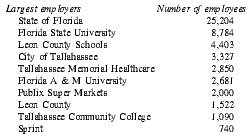Tallahassee: Economy
Major Industries and Commercial Activity
Government is the central focus of Tallahassee's economy, although education, printing and publishing, food processing, and the lumber industry play important roles as well. As Florida's state capital, Tallahassee enjoys a stable economy and a comparatively low unemployment rate. A recent survey of occupations and industries found a wide variety of employment sectors.
Tallahassee is a high technology center and is sometimes referred to as "Silicon Valley South." Institutions such as Innovation Park/Tallahassee, affiliated with Florida A&M University and Florida State University, and Smart Park, a privately owned 130-acre fiber-optic research center, place Tallahassee on the cutting edge of technology. The city boasts that it is the most wired community in the country.
Items and goods produced: pulpwood, pine extracts, insecticides, pre-stressed concrete, lumber, boats, feed
Incentive Programs—New and Existing Companies
Local programs
Local city and county governments and the Tallahassee Area Chamber of Commerce have joined together to form the Economic Development Council, which works toward promoting a diversified economy that continues to grow and create more jobs and business opportunities for both new and existing industries. In 2004, the Chamber announced the creation of Action 2010, to promote Tallahassee as a center of art and culture, while expanding local business areas.
State programs
Enterprise Florida, Inc. is a partnership between Florida's government and business leaders and is the principal economic development organization for the state of Florida. Enterprise Florida's mission is to increase economic opportunities for all Floridians, by supporting the creation of quality jobs, a well-trained workforce, and globally competitive businesses. It pursues this mission in cooperation with its statewide network of economic development partners.
Job training programs
The Workforce Development Board (WDB), commonly known as Jobs & Education Partnership, is a part of Enterprise Florida, Inc. WDB provides policy, planning, and oversight for job training programs funded under the new federal Workforce Investment Act (WIA), formerly Job Training Partnership Act (JTPA), along with vocational training, adult education, employment placement, and other workforce programs administered by a variety of state and local agencies. Regional Workforce Development Boards operate under charters approved by the Workforce Development Board. The 24 regional boards have primary responsibility for direct services through a statewide network of One-Stop Career systems. State and local workforce development efforts are concentrated on three broad initiatives: First Jobs/First Wages focuses on preparing workers for entry-level employment including the School-to-Work and WAGES (Work and Gain Self-Sufficiency) programs; High Skill/High Wages targets the higher skills needs of employers and training workers for advancement including Performance Based Incentive Funding (PBIF), Occupational Forecasting Conference/ Targeted Occupations, Quick Response Training (QRT), and Incumbent Worker Training (IWT); One-Stop Career Centers are the central elements of the One-Stop system for providing integrated services to employers, workers, and job-seekers.
Development Projects
In 2005, planning began for a large community performing arts center. Several hotel and condo developments are also scheduled to begin, including the delayed Marriott Civic Center hotel, condo and convention center project.
Economic Development Information: The Economic Development Council of Tallahassee/Leon County, Inc., 100 N. Duval, PO Box 1639, Tallahassee, FL 32302; telephone (850)224-8116, fax (850)561-3860. Michael Parker, Director, City of Tallahassee Economic Development Department, 300 South Adams Street, Tallahassee, FL 32301; telephone (850)891-8625; email parkerm@talgov.com
Commercial Shipping
Tallahassee is served by 13 motor freight carriers, as well as several package delivery services.
Labor Force and Employment Outlook
Tallahassee businesses have access to a labor force in which more than 41 percent of working adults hold college degrees. Inc. magazine has ranked Tallahassee among the "Best Small Metro Areas to start and grow a business." In 2002, Forbes magazine listed Tallahassee as one of the Best Places for Business and Careers. The fastest growing business sectors are telecommunications, computer hardware vendors, software developers, and trade associations.
The following is a summary of data regarding the Talahassee metropolitan area labor force, 2003 annual averages.
Size of nonagricultural labor force: 158,600
Number of workers employed in . . .
construction and mining: 7,300
manufacturing: 3,600
trade, transportation and utilities: 22,200
information: 3,800
financial activities: 7,200
professional and business services: 17,600
educational and health services: 16,200
leisure and hospitality: 13,100
other services: 7,600
government: 60,100
Average hourly earnings of production workers employed in manufacturing: $14.09 (2003 statewide average)
Unemployment rate: 2.7% (December 2004)

| Largest employers | Number of employees |
| State of Florida | 25,204 |
| Florida State University | 8,784 |
| Leon County Schools | 4,403 |
| City of Tallahassee | 3,327 |
| Tallahassee Memorial Healthcare | 2,850 |
| Florida A & M University | 2,681 |
| Publix Super Markets | 2,000 |
| Leon County | 1,522 |
| Tallahassee Community College | 1,090 |
| Sprint | 740 |
Cost of Living
The following is a summary of data regarding several key cost of living factors for the Tallahassee area.
2004 (3rd Quarter) ACCRA Average House Price: $261,680
2004 (3rd Quarter) ACCRA Cost of Living Index: 101.4 (U.S. average = 100.0)
State income tax rate: None
State sales tax rate: 6.0%
Local income tax rate: None
Local sales tax rate: 1.5
Property tax rate: 3.2 mills per $100 of assessed valuation
Economic Information: Tallahassee Area Chamber of Commerce, 100 N. Duval, PO Box 1639, Tallahassee, FL 32302; telephone (850)224-8116